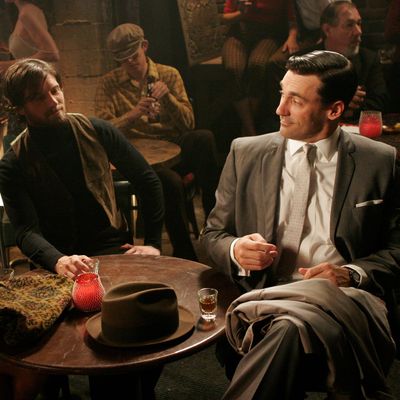
New York is Israel, Israel is Utopia, Utopia is Babylon, and Babylon is New York. All these places are home and not home, a place and an idea, a thing that is and cannot be.
Midway through “Babylon,” Don Draper, whose agency had a spec meeting with the Israeli Tourism Bureau, goes to lunch with Rachel Menken. He wants to pick her brain about Israel, the place and the idea. The heart of the scene is Rachel’s description of the Jews as a people who “have lived in exile for a long time.” “Why aren’t you there?” Don asks her. She does live in her own Israel, the store that gives her more contentment than any person in her life.
Israel, she says, “is more of an idea than a place.” “Utopia,” Don says. Rachel says she learned in college that utopia is a Greek word whose meaning changes with its pronunciation. “The Greeks had two meanings for it: you-topos, meaning ‘the good place,’ and oo-topos, meaning ‘the place that cannot be.’”
Don seems like a possible Utopia to Rachel, and Rachel to Don. She’s one of three potential Utopias in Don’s current sexual landscape, the others being Midge and Betty.
He’s endangering his Betty utopia by visiting the others. Betty doesn’t know about her rivals, but she still worries that Don’s too desirable to be faithful. Snuggling in bed, he suggests they study “advanced reproduction” together, and when he jokes that he flunked the class, she says it’s because “you got caught cheating,” and lets the remark hang there.
There’s another Utopia in the hotel where Joan and Roger enjoy matinees with room service. “Do you have any idea how unhappy I was before I met you?” he asks her. He’s afraid he’ll lose her to a younger man, and she’s afraid he’ll trade her in, like a car, for a “newer model.”
The subtlest and most significant haven in “Babylon” is the one that carves itself out in Peggy’s mind as she starts to change. She participates in a focus group exercise for Belle Jolie lipstick, fixates on a lipstick-blotted tissue as another secretary tosses it into a trash can, christens the trash can a “basket of kisses,” and wins the alcoholic, sexist Freddy Rumsen’s (Joel Murray) admiration—and a tryout as a copywriter. The gig requires Don’s approval, and Peggy might not have secured it if Don hadn’t mused on the useless, predictable maleness of the boys’ Right Guard campaign in “Ladies Room” and asked, a touch haplessly, “What do women want?” What they want, Peggy tells Freddy, is to not feel like “one of a hundred colors in a box.” As directed by Andrew Bernstein, Peggy’s focus group epiphany captures Peggy’s sense of social isolation. Then it suggests that the same feelings of alienation that spur her to watch and listen instead of participate also mark her as an artist. The scene feels like an answer to the slow-motion scene of Peggy at her desk in “Ladies Room.” She was helpless there, but this time she’s in command, tapping her creative power as if it were a Vermont maple tree and being rewarded for her insight.
A place can be a place but also an idea. A person’s identity can be at once emotionally true and quite obviously constructed. Don Draper is Don Draper and Dick Whitman. He is straitlaced and uptight but also more open to lifestyle experimentation than anyone who knows him could imagine. Salvatore Romano is a dapper, “straight” art director pined after by certain female office workers, and a tormented gay man who’s keeping his sex life under wraps; the office Sal may be fake, but he sells it so exuberantly that straights never see through it. Don and Roger and Pete are married men who all have girlfriends they adore as much as, or more than, they love their wives. Are these (Walt) Whitmanesque poetic beings who are large and contain multitudes, or are they in some sense “passing”?
When Don slips on the stairs, early in the episode, he experiences the series’ first flashback. He sees his childhood family standing over young Dick Whitman after a fall. His stepmother’s lover, Mack (Morgan Rusler), beckons him into a room where the newborn Adam is squalling. This is a glimpse of the life Don fled and repudiated, triggered by Adam’s reappearance.
Adam’s arrival is one of many disruptions of the fragile world Don has built for himself. There’s a smaller disruption in this episode, when Don finds Midge’s other beau, Roy (Ian Bohen), in her apartment. What ensues is not just a competition between Roy and Don for Midge but a visualization of conflicting impulses within Don, who’s outwardly square but has rebellious, even anarchistic, tendencies.
Writers Andre and Maria Jacquemetton’s view of America’s pre-hippie counterculture is too broad and too reactionary: It seems to take the emotionally constipated Don’s point of view, and it validates gripes that Mad Men condescends to the past, or to certain value systems. But even though it’s vicious, it’s also funny, because it’s not entirely unfair. Every oppositional culture attracts poseurs, and there are plenty on display here, as well as authentic artists that Don recognizes as such. The place is a coffeehouse where four out of five men have beards and a man onstage reads wedding announcements in a Russian-accented monotone. Don, Roy, and Midge enter just as Roy is telling her about a friend who collects miniature replicas of American monuments and sticks them up his ass. (“Symbolism intended,” he explains.) When Roy learns that Don is an adman who is “perpetuating the lie,” he asks, “How do you sleep at night?” Don replies, “On a bed made of money,” then adds, “People want to be told what to do so badly that they’ll listen to anyone.” “When you say ‘anyone,’ I assume you’re talking about thou,” Roy says. He’s right, and Don knows it; that’s why he laughs. Roy and Midge discuss Roy’s plan to create “a theater of the people, not the soulless bullshit kept alive by the middle class by their season tickets to Dick Van Dyke and Mary Martin” on “Broadway . . . the birthplace of the theater of mediocrity.” “Maybe it’s born there, but I think it’s conceived right here,” Don says, indicating the stage, where a woman recounts a dream about having sex with Fidel Castro and takes her top off.
But when a trio onstage begins playing “Babylon” and singing in three-part harmony (“We lay down and wept / And wept / For thee, Zion”), Don seems to understand its relevance to his life, and like everyone else in the coffeehouse, he stops talking and listens. The devastating closing montage peeks into a few other Zions: Rachel in Menken’s; Betty putting lipstick on Sally; Roger and Joan dressing postcoitus, preparing to leave the hotel separately.
Each time we see Don he seems closer to tears.
Excerpted with permission from Mad Men Carousel by Matt Zoller Seitz.





